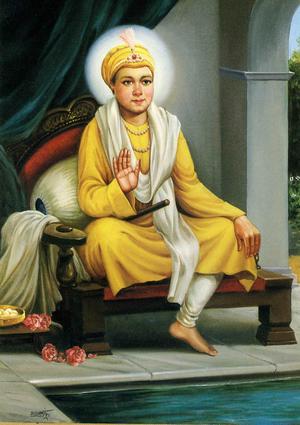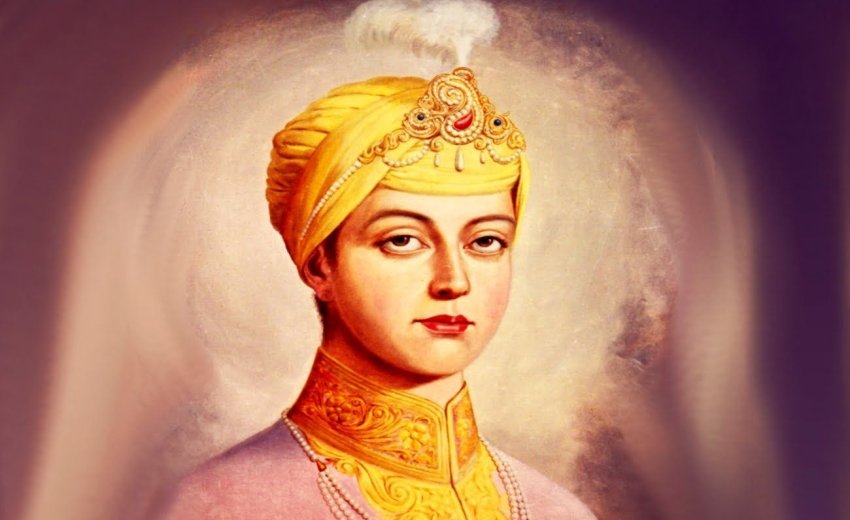On the fourth day of the black half of the month Cet, Gurū Har Kriśan Jī was taken ill by a fever which made his eyes red, his breath fast and his body so hot that the heat could even be felt from some distance away. His mother sat at his bed tending him and once mournfully said:
“My son, you intend to die. Why? You have only been made Gurū a short time ago. It really is too early for you to go. Stay, enjoy your life, have a family and then go to the SATGURŪ.”
She was silent for some time and then continued: “Why are you turning away from the world at your tender age?” “Oh my honoured mother, I understand that you feel that way from your deep love of me. But don’t worry about me. It is our duty to accept GOD´s will. So why should we be attached to our mortal remains when it is time to shed our body? What is today? What will be tomorrow? Whatever VĀHIGURŪ does is the best.”
“Why are you turning away from the world at your tender age?” “Oh my honoured mother, I understand that you feel that way from your deep love of me. But don’t worry about me. It is our duty to accept GOD´s will. So why should we be attached to our mortal remains when it is time to shed our body? What is today? What will be tomorrow? Whatever VĀHIGURŪ does is the best.”
When Gurū Jī had said this to his mother, he decided to go to the banks of the Jamnā outside town to breathe purer air. He had his tent pitched near to Rājā Jai Singh´s military camp, who was in the town at this time. When Rājā Jai Singh heard that Gurū Har Kriśan had left the town, he at once sent one of his men to him to ask whether he had offended the Gurū in any way. At that, Gurū Jī let him know that he was ill.
Rājā Jai Singh at once went to see Gurū Har Kriśan, not necessarily because he wanted to find out about his illness but because he wanted at last to appoint a time for a personal meeting with the ruler on whose orders he had tested the Gurū. But Gurū was already too ill to respond to that.
The next day, the Gurū´s skin was covered with purulent bumps – a sure sign of the pox. The pox, the fever and the deep unconsciousnesses again and again, and still the young Gurū did not complain once, but his lips continuously formed VĀHIGURŪ.
As the Gurū´s state was very serious, all Sikhs were asked to sing the hymns from the Gurū Granth Sāhib Jī for him. But that did not change his condition, and everyone feared the worst.
Gurū Har Kriśan Jī knew that his time in the world was over because VĀHIGURŪ JĪ needed him elsewhere. Therefore he invited all those who wanted to see him a last time to visit him. Besides his beloved Sikhs, Rājā Jai Singh, Gurbakhś and many others who revered him came to his deathbed. Gurbakhś reverentially joined his palms in front of his chest, bowed and said: “Great King, all former Gurūs gave their Sikhs appointments or made them their filial inheritants. You, who are so young, leave us without a Gurū. How shall the Sikhs deal with such a disaster? Do your loyal Sikhs the honour of staying alive until you have a son who can be a Gurū. Then you may go, but not now, please.”
“Don´t worry. The SATGURŪ will work what is the best. My death is inevitable. The glory of Gurū Nānak´s throne shall increase day by day. The Gurūs may die, but their hearts and their minds, the Gurū Granth Sāhib Jī, will always be with you and accompany you. The Gurū Granth Sāhib Jī contains divine knowledge, the teachings of religion and the spiritual knowledge of the Gurūs. Read it and act according to its advice and Gurū Nānak Dev Jī will stand by you always. Put your trust in it and always remember its teaching. Do not waver and aim your thoughts at GOD.”
When the Sikhs understood from his words that the time for parting really had come for themselves and the Gurū, they began to wail loudly. They complained his early death and about the lack of someone who would teach them the lessons of religion. Gurū Jī saw and felt their fear and spoke to them very lovingly: “The world is ephemeral. It is a great sin to focus your mind on it, to stick to joy and pain and blame mistakes on GOD. We should accept GOD’s will and humbly accept his joy as our joy. Whatever he works, it is the best for us. As Bābā Nānak said in the Jap Jī:
´Whatever pleases you, GOD, is good. This body has to perish one day. What does it matter whether it dies now or after many years? Whoever does GOD´s will forsakes pride and other mortal sins. He remembers the TRUE NAME and crosses the terrible and dangerous ocean of the world and is free of sorrow and pain forever.´”
After these words Gurū Har Kriśan Jī´s spirits faded away more and more. He was silent, closed his eyes but opened them again after a short while and looked at his Sikhs with great affection. Rājā Jai Singh came to see the sick Gurū once more and repeated the ruler’s request for a meeting, but the Gurū declined once more and said that the ruler should direct his attention to the hymn that he had written for him.
When Gurū Jī´s disease had progressed so far that he felt his end come close, he for a last time called all those who wanted to see him. Gurbakhś was among them, very reverentially put his hands together in front of his chest, bowed to the Gurū and said: “My Gurū, Rām Rāi is in mutual harmony with the local ruler. In the Pañjāb there is Dhīr Mal and other Sodhīs who have claimed Gurūship for themselves. They are only waiting for your death. The uneducated Sikhs will fall victims to their snares and the educated Sikhs will suffer from the results. The blooming tree of the Gurūs that was cherished so much up to now will wither. Everyone will want to be a Gurū in their own house. Different sects with deviant teachings and even heresies will grow. Do us the mercy and appoint a Gurū for our salvation.”
“What are you afraid of so much? The blooming tree of Sikhism that was planted by Gurū Nānak Dev Jī´s sacred hands can never be destroyed. Droughts, storms and heat may seem overpowering, but Sikhism will never lose its religious power and its spiritual radiance.”
After that Gurū Har Kriśan Jī asked for five paisās and a coconut. He took both and, as he was unable to move, he made a sign with his hands three times as if he walked around his successor three times, venerating him. Then he said: “Bābā Bakālā.” That meant that his successor would be found in the village of Bābā Bakālā.
Exhausted, the Gurū paused. When he had regained enough strength to speak, he asked his Sikhs to sing the Gurū´s hymns and keep repeating GOD´s name again and again in praise.
When the night had long exceeded its zenith and there was no sign of improvement in the Gurū´s condition, his mother, Kriśan Kaur Jī, who sat at his bed and looked at his handsome face, grew very sad and started wailing.
“Oh, what shall I do in the world on my own after losing my kind-hearted husband and my dutiful son? Where will I meet them again, and how shall I live without them?”
“My honoured mother, do not be afraid. You have spent the larger part of your life in happiness. Spend the remaining years of your life in the SATGURŪ´s service. Remember what Gurū Arjan Dev Jī said: ´If even a physician cannot help and there is neither brother nor sister, only GOD can help. Whatever HE wishes, happens. HE cleanses the impurities of sin. Remember the SUPREME BEING.´ By rembering GOD, you will arrive at yourself. You will never be in sorrow again and never be separated from us.”
These words of sweet comfort touched the mournful mother´s heart like tender blossoms and took the leaden pain away from the hour of parting.
His beloved Sikhs sang the Gurū´s hymns. The sacred songs flowed through the room where the sick Gurū lay and were only outshone by the highest and most precious of all words, VĀHIGURŪ.
Surrounded by sacred songs, Gurū Har Kriśan Jī took a last deep breath, then his young heart stopped beating forever.
The Sikh´s records give this day as the fourtheenth day of the bright half of the month Cet in the Samvat-year 1721 (March 30, 1664 A.D.)
Gurū Har Kriśan Jī´s body was given to the fire on a plain called Tilkharī, south of Dillī by the banks of the Jamnā. The grave with his ashes has remained intact until now. At the place where Gurū Har Kriśan Jī had lived and worked a Gurdvārā was erected in his honour.
~Elisabeth Meru (excerpted from her book From the Heart of Sikhism)
Related story: Elisabeth Meru - The Journey Home
Editor's note: This article was originally published on Sep 11 2012

